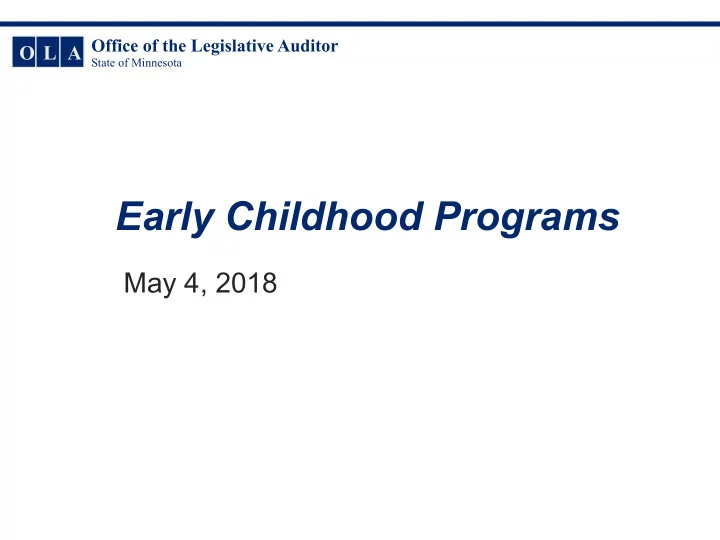

O L A Office of the Legislative Auditor State of Minnesota Early Childhood Programs May 4, 2018 1
Office of the Legislative Auditor • Nonpartisan • Financial Audit Division • Program Evaluation Division O L A 2
OLA in State Government Legislative Executive Judicial Branch Branch Branch Governor Constitu- House of Senate Courts tional Representatives Officers State Agencies OLA O L A 3 3
Key Findings • Programs are complex, fragmented • Not currently possible to determine extent of potential duplication • Statewide data on program effectiveness are inadequate • Legal requirements limit sharing data across programs • Extent of early childhood screening is unknown O L A 4
Programs Offering Direct Services • Early Childhood Family Education • Early Childhood Health and Development Screening • Family Home Visiting • Head Start and Early Head Start • School Readiness Program • Voluntary Prekindergarten O L A 5
Programs that Provide Funding Rather than Services • Child Care Assistance Program (CCAP) • Early Learning Scholarships o Pathway I, awarded to individual children o Pathway II, awarded to certain early learning programs or child care programs O L A 6
Quality Rating System Parent Aware Quality Rating and Improvement System o Qualifies programs to accept scholarships and higher reimbursements for child care assistance O L A 7
Complex, Fragmented Programs • Eligibility requirements differed • Income is not an eligibility requirement for Early Childhood Family Education, Screening, and Voluntary Prekindergarten • Among other programs, income limits differ by program O L A 8
Income Eligibility 2017 Income Limit for Family of Four $64,423 $49,200 $45,510 $45,510 $31,980 $24,600 O L A 9
Staffing Requirements Differ Early School School Voluntary Childhood Readiness Readiness Prekindergarten Family Plus Education Maximum Class √ √ √ Size Staff-Child Ratio √ √ √ Salary Requirement √ Teacher Licensure √ √ Program Supervisor √ √ Licensure O L A 10
Funding and Program Differences Early Early School Voluntary Childhood Learning Readiness Prekindergarten Family Scholarships- Program Education Pathway II Compete for √ √ Funding User Fees In limited √ √ Allowed circumstances Transporting Preschool √ Children O L A 11
Recommendation • The Legislature should consider aligning eligibility and funding requirements for certain programs o Could lead to a single application form for certain programs o Could allow providers more efficiency • The Legislature could convene a working group as a first step O L A 12
Potential Duplication • Not possible to determine extent of potential duplication • Agencies use different methods to identify children O L A 13
Potential Duplication (cont.) • Longitudinal data system o Not designed to identify potential duplication o Missing and incomplete data • Department lacks participation data • Lack of information on local program delivery O L A 14
Children Using Multiple Funding Streams 15% of children who used Scholarships awarded in FY 2016 also used Child Care Assistance to pay for a program • Does not indicate duplicative funding O L A 15
Children in Multiple Programs 27% of children registered in Voluntary Prekindergarten in FY 2017 were also registered in School Readiness program • Could not determine extent of potential overlap O L A 16
Recommendation • Minnesota Department of Education (MDE), Minnesota Department of Health (MDH), and Department of Human Services (DHS) should jointly identify what is needed to use a universal identification number • MDE should consistently collect participation data O L A 17
Statewide Data on Effectiveness are Inadequate • Statutes do not require all programs to report on their effectiveness • Statutes place priority on school readiness • Data do not exist to measure whether children statewide are ready for school O L A 18
Assessment Requirements Differ Head Start and Early Voluntary School Head Start Prekindergarten Readiness Program Assessments √ √ √ Required Must Align with √ √ Standards Tool Must be State √ Federal Approved Skills Measured Literacy, cognition, motor development, Cognitive and Cognitive and social and emotional language skills language skills development O L A 19
Assessments at Kindergarten • No state requirement to assess school readiness in kindergarten 81% 49% assessed all used assessment children for school tools other than readiness MDE approved O L A 20
Recommendation • Legislature should consider requiring assessments of all children’s school readiness as they complete certain early childhood programs o Eventually, all publicly funded, Parent Aware- rated programs o Use a state-approved assessment tool o Submit assessment results to the state • Legislature should consider requiring assessments for children in kindergarten O L A 21
Recommendation • The Legislature should direct MDE, MDH, and DHS to plan a comprehensive approach to evaluating impacts • Legislature would specify general outcomes • Agencies would identify indicators of effectiveness • Legislature would decide whether to proceed O L A 22
Legal Requirements Limit Data Sharing Across State Agencies • Laws protect children’s identity • Laws prohibit sharing data unless the subject of the data gives informed consent • Restrictions can interfere with program operations O L A 23
Recommendation • The Legislature should consider broadening authority for MDE, MDH, and DHS to share individual-level data from early childhood programs O L A 24
Early Childhood Screening • State law requires that all children undergo health and development screening, with exception for conscientious objections • The number of children who are not screened is unknown O L A 25
Recommendation • Minnesota Department of Education should collect data on children who are not screened O L A 26
Summary Changes are needed to address: • Program complexity and fragmentation • Lack of data on whether young children statewide are prepared for school • Need to measure program impacts • Legal restrictions on data sharing • Unknown number of children not screened O L A 27
Early Childhood Programs www.auditor.leg.state.mn.us O L A 28
Recommend
More recommend